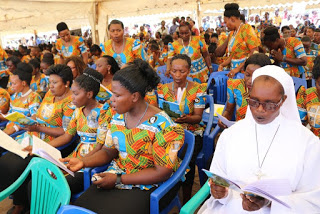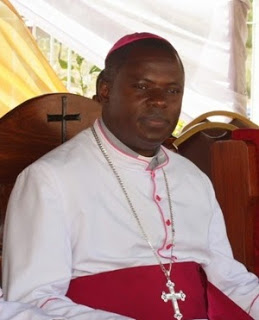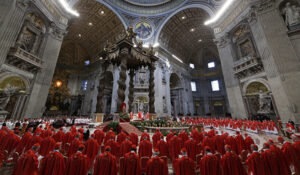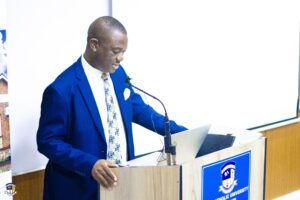TANZANIA: The Journey of Catholic Church in Tanzania bears fruits in Africa-Presidents of TEC says

The President of Tanzania Episcopal Conference, Rt. Rev. Gervas John Mwasikwabhila Nyaisonga said that, Catholic Church in Tanzania celebrates a successful journey that is celebrated not only in Tanzania but Africa.
He said this as during his address at the Celebration of 150 years’ Jubilee of Evangelization in Tanzania mainland, held on 4th November 2018 at Bagamoyo, which is recognized as the door of faith in Tanzania.
“As we celebrate 150th Jubilee of Evangelization in Tanzania, we celebrate with Africa because our history has produced the best fruits on Africa continent and in the world world at large. Laurian Cardinal Rugambwa, a Tanzanian, is the first African cardinal; the late Julius Kambarage Nyerere, Father of the Nation and First President of Republic of Tanzania, is on the path to sainthood because he lived Gospels values and helped most of African countries to become independents from colonization; Sister Bernadetta Mbawala, OSB, who have been identified as servants of God, we hope she will one day announced the blessed and eventually saints,” he said.

President TEC and Bishop of Mpanda Diocese
Rt. Rev. Nyaisonga also said that Tanzania is a mother of the Association of Member Episcopal Conferences of Eastern Africa (AMECEA), which is a strong Association working for the pastoral, spiritual and social welfare in nine African countries.
Commenting on the AMECEA General Assembly held in August 2018 in Addis Ababa, Ethiopia, Bishop Nyaisonga said it was a fruitful meeting that promoted unity and solidarity among African countries despite the differences in giftedness, color and race, among others.
“Tanzania, being member of AMECEA, has the opportunity to learn from others and grow. This is the fruit of evangelization between 150 years that we celebrate today. Bishops in AMECEA countries recognize and respect that our differences in gifts, talents, social wealth is unique and must unite us in promoting human dignity, unity and peace.”
Rt. Rev. Nyaisonga urged Tanzanians to be committed to to building a nation of people who freely express their gifts in respect of equality, peace and unity,” he said. He thanked Holy Spirit Missionaries (Spiritans), the first missionaries who brought the Gospel in Tanzania lead by Father Anthony Honer in 1868.
“Their mission continues up to today here in Bagamoyo and in different parts of the country. In 1878 the second missionaries, the White Fathers, arrived in Tanzania through Bagamoyo and went westward to Uganda. Then Benedictines missionaries arrived in 1889,” he added saying that Tanzania thanks God for giving the country the opportunity to know and trust Jesus Christ, the Redeemer of all.
Indeed, the Gospel in Tanzania has become a source of salt and light to all Tanzanians in various aspects of life, especially in the spiritual and social aspects. Catholics have been involved in building up the kingdom of God in Tanzania in social services.
As Tanzania is celebrating 150 years of Evangelization, it celebrates education institutions owned by TEC – 228 kindergarten schools. Almost every Parish in the 34 Catholic dioceses has a kindergarten where the Church gives pre-primary education.
There are 165 primary schools most of them English Medium, Secondary school and Minor seminaries. There are 262 secondary schools that offer secondary education;
Vocational Training Centers 110. The Conference has four full fledged Universities; Saint Augustine University of Tanzania (SAUT) which has more than 4 branches, Catholic University of Health and Allied Sciences (CUHAS), Ruaha Catholic University (RUCU) and Mwenge Catholic University (MWECAU).
The Church also owns a Zonal Consultant Referral Hospital; six Regional Hospital; 19 Council Designated hospitals; 29 Voluntary Agency Hospitals; 94 Health Centers and 338 Dispensaries.
The Church in Tanzania owns 12 radio stations, one television, four newspapers and other publications from religious congregations.
There are two publication industries; Ndanda Publication Ltd for Benedictines and TMP for Tanzania Episcopal.
Missionaries built the first seminary in Rubya, Bukoba, in 1904 which produced Tanzania’s first four first local priests in 1917.
In 1967 Bishops in Tanzania joined efforts and formed three Major Seminaries Kibosho major seminary in Moshi and Ntungamo Major seminary in Bukoba for Philosophy and Kipalapala Major seminary in Tabora for theology.
His Eminence Laurean Cardinal Rugambwa in 1984 added the fourth Major Seminary for Theology, Segerea Seminary in Dar es Salaam. The southern Zone of Tanzania remained with the Peramiho Seminary for Philosophy and Technology. Tanzania has thousands of Priests, Religious men and women and Catechists who are agents of evangelization in Tanzania and beyond.
He thanked President John Magufuli of United Republic of Tanzania for good governance and transparence, accountability and integrity while promising him prayers from all Catholic Bishops so that he continues to lead Tanzania with peace and solidarity.
He said that, President Magufuli is also a fruit of 150-year Jubilee Tanzania as he marks three years since he became a president.
The church is grateful for the great work he has done in building up and maintaining the conscience and fear of God; tax and discipline in work, constructions and consolidation of structural approaches with the concept of leadership as services to Tanzanians.
He also highlighted some challenges which face the country including kidnapping of people; assaults of innocent people; neglecting the rule of law; acts of corruption and violence in the social services industry; land disputes for pastoralists and farmers in many rural areas; the lack of employment for young people from the private sector and that should not to be overlooked.
Other challenges facing Tanzania include environmental degradation of forests; abuse of power; major delays in issuance of permits such as licenses and documents; scarcity of health professionals; and water scarcity in most Tanzanians especially rural.
On behalf of Tanzania Episcopal Conference, Bishop Nyaisonga recommend close follow-ups and monitoring at all levels, and dialogue with development stakeholders for peace and unity among Tanzanians.
∽End∽
Sarah Pelaji, TEC


